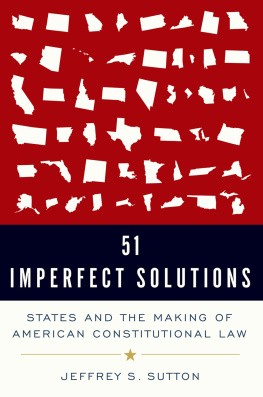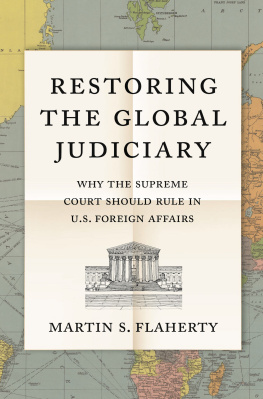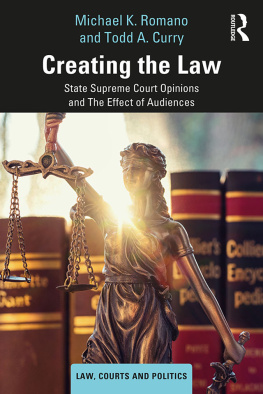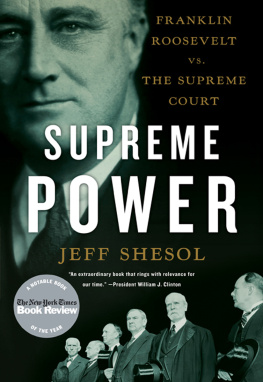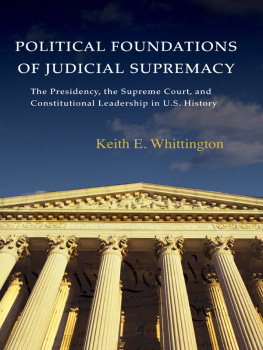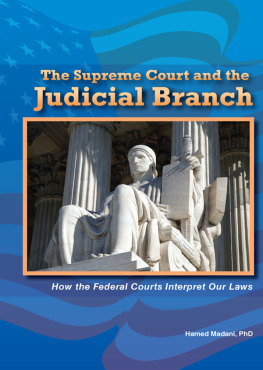T HE US S UPREME C OURT
AND THE C ENTRALIZATION
OF F EDERAL A UTHORITY
SUNY series in American Constitutionalism
Robert J. Spitzer, editor
T HE US S UPREME C OURT
AND THE C ENTRALIZATION
OF F EDERAL A UTHORITY
Michael A. Dichio
Published by State University of New York Press, Albany
2018 State University of New York
All rights reserved
Printed in the United States of America
No part of this book may be used or reproduced in any manner whatsoever without written permission. No part of this book may be stored in a retrieval system or transmitted in any form or by any means including electronic, electrostatic, magnetic tape, mechanical, photocopying, recording, or otherwise without the prior permission in writing of the publisher.
For information, contact State University of New York Press, Albany, NY
www.sunypress.edu
Library of Congress Cataloging-in-Publication Data
Names: Dichio, Michael A., 1986 author.
Title: The US Supreme Court and the centralization of federal authority / Michael A. Dichio.
Other titles: U.S. Supreme Court and the centralization of federal authority | United States Supreme Court and the centralization of federal authority
Description: Albany [New York] : State University of New York Press [2018] | Series: SUNY series in American constitutionalism | Includes bibliographical references and index.
Identifiers: LCCN 2018003724 | ISBN 9781438472539 (hardcover : alk. paper) | ISBN 9781438472546 (ebook)
Subjects: LCSH: United States. Supreme CourtHistory. | Federal governmentUnited StatesHistory. | Constitutional historyUnited States.
Classification: LCC KF8742 .D53 2018 | DDC 342.73/042dc23
LC record available at https://lccn.loc.gov/2018003724
10 9 8 7 6 5 4 3 2 1
To my parents, Anna and Anthony, and
To my grandparents, Michelina and Antonio
Contents
Illustrations
Tables
Figures
Acknowledgments
Ive long loved reading acknowledgments because they are one of the few places in academic literature where we get to see the author as a person. To see the people and the values the author cherishes and to dedicate a space for humility allows us to recognize that virtually nothing in lifeeven things that seems like yours, such as a bookare not just your own creation.
This project first began in graduate school at Cornell University, where I was fortunate enough to assemble a committee who provided support, much-needed criticism, and perhaps most importantly, genuine curiosity about my project.
So let me begin by thanking those who contributed most directly to the intellectual development of this project in graduate school. Elizabeth Sanders offered invaluable historical references and incredible attention to the prose while treating me to long lunches and coffee. Her warm and generous guidance has made me a better adviser to my own students. Aziz Ranas persistent curiosity and excitement over my project renewed my intellectual energy when I struggled the most. Each time we met, I left feeling revived and eager to tackle additional questionsthe sign of a gifted adviser. As one of my professors during my undergraduate years at Boston College, Ken Kersch generously agreed to sit on my dissertation committee. This gesture and enormous undertaking is something I dont think I can ever fully repay. From the beginning, Ken not only took great interest in my research ideas, but took interest in me as a person and as a professional.
Of all these wonderful advisers, however, none were more integral to my development as a scholar than my dissertation chair, Richard Bensel. Richards attentiveness to his students is truly extraordinary. He read everything down to the very last, tiny footnote in this projectand he did it with remarkable speed while still providing extensive commentary. By the end of my time at Cornell, I had only become more amazed at Richard as an adviser and as a scholar.
Richard and Ken, especially, have remained a font of support and an invaluable source of feedback as I developed this project into a book, and Im so grateful to have them as advisers.
Beyond my dissertation committee, I have had the help of many others. The late Ted Lowi and his John L. Senior Chair of Institutions provided generous support so I could hire four excellent research assistantsDan Marcus, Eric Silverberg, Malhar Naik, and Julius Kairey. Their help in data collection and coding made this project far more manageable than it would have been otherwise. Early on in graduate school, Ted Lowi and Isaac Kramnick fostered my love for public law and American political thought, and guided me through my public law course of study. Along with Ted and Isaac, Michael Jones-Correa provided invaluable feedback when I first created this project as a dissertation prospectus. While at Cornell, I was also lucky to meet a number of colleagues who offered support along the wayNolan Bennett, Paul Herron, Desmond Jagmohan, Julianna Koch, Danielle Thomsen, Martha Wilfahrt, and Alexis Walker. Over countless late-night conversations, Jason Hecht and Igor Logvinenko, in particular, provided support and encouragement when I most needed it. I owe a special thanks to Phil Rocco, who read the entire revised manuscript.
While at Fort Lewis College, I have benefited immensely from the collegiality and from spirited discussion with my colleagues, especially Ruth Alminas, Brad Clark, Paul DeBell, Justin McBrayer, Dugald Owen, and Sarah Roberts-Cady. The colleges Faculty Development, especially its chair, Ryan Smith, and the Fort Lewis College Foundation have generously supported my research endeavors. I owe a special thanks to Stacey Sotosky for providing never-ending encouragement and creative perspective, and for renewing my energy when I needed it the most. I also appreciated the thorough and thoughtful feedback from SUNY Presss anonymous reviewers, which have undoubtedly improved this book.
Finally, I would be nowhere without the ceaseless support and unbounded love from my familyespecially my parents, Anna and Anthony, my siblings, Justin and Alexa, and my grandparents, Lina and Tony, and Uncle Michael. They help keep everything in perspective and remind me of lifes most precious gifts.
Introduction
On June 26, 2015, Justice Anthony Kennedy wrote the majority opinion in a landmark gay-marriage case, Obergefell v. Hodges , for the US Supreme Court. The fundamental liberties protected by [the Due Process] Clause include most of the rights enumerated in the Bill of Rights, he wrote. In addition these liberties extend to certain personal choices central to individual dignity and autonomy, including intimate choices that define personal identity and beliefs. In ringing language, he concluded, The Constitution, however, does not permit the State to bar same-sex couples from marriage on the same terms as accorded to couples of the opposite sex.
The four dissenters made clear their vociferous opposition. Quoting in part from Federalist No. 78, Chief Justice Roberts said, But this Court is not a legislature. Whether same-sex marriage is a good idea should be of no concern to us. Under the Constitution, judges have power to say what the law is, not what it should be. The people who ratified the Constitution authorized courts to exercise neither force nor will but merely judgment. According to Chief Justice Roberts, the majoritys opinion was an act of will, which would transform the marriage laws of more than half the states and alter a social institution that has formed the basis of human society for millennia, for the Kalahari Bushmen and the Han Chinese, the Carthaginians and the Aztecs. Just who do we think we are?




